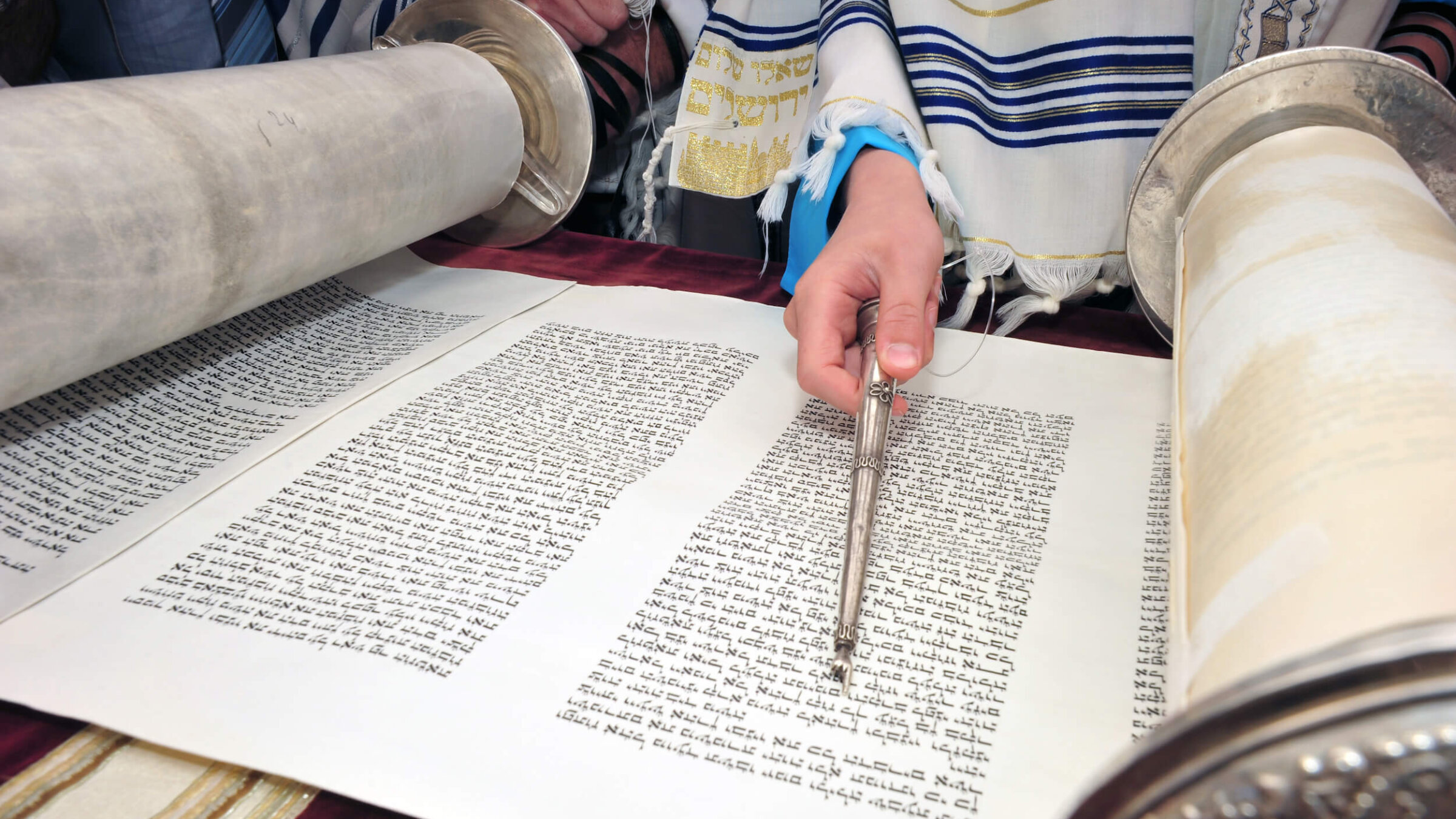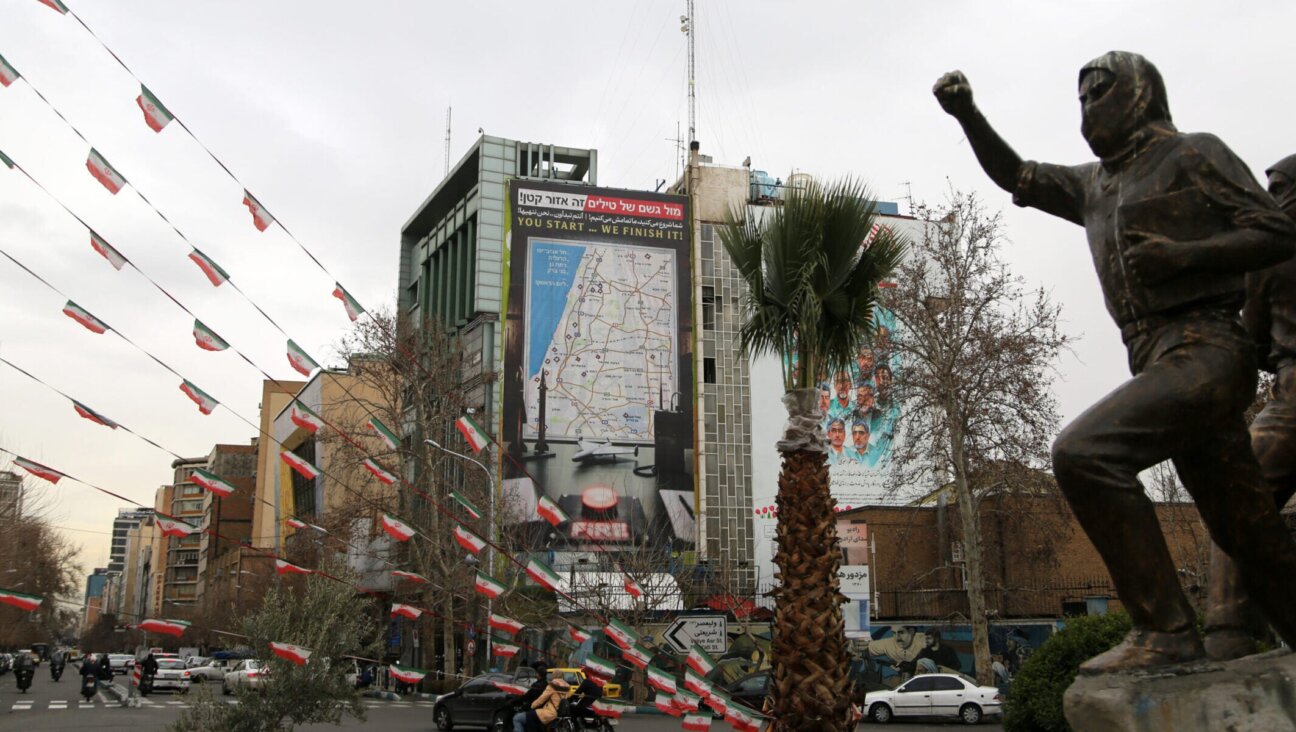Two congregations, two opinions as Torahs hit the floor at separate NYC services
The ‘unthinkable’ happens twice when sacred scrolls tumble from the ark

Torah scroll being read at a bar mitzvah Photo by iStock by Getty Images
(JTA) — During Sunday morning services at the Hebrew Institute of Riverdale, Rabbi Jeffrey Fox had just opened the door to the ark and turned to put his prayerbook down on the lectern when he heard an “unthinkable” sound: One of the Torah scrolls kept in the cabinet had fallen to the floor.
His heart sank, and gasps were heard at the Modern Orthodox congregation in the Bronx, where Fox is a member and plays an informal rabbinical role when the paid clergy are otherwise engaged. Tradition regards the dropping of a Torah scroll as such a dishonor that it demands communal penance — famously although not compulsorily, some authorities say the dropper and witnesses should fast for at least a day and maybe 40.
Meanwhile, just the day before, the same thing happened at Altshul, the independent egalitarian minyan that meets at Congregation Beth Elohim in Brooklyn. There a scroll fell out of the ark during Saturday morning Shabbat services.
Torah scrolls are treated with such reverence that on the rare occasions that they are dropped, it becomes news, at least in the Jewish media. For those with a superstitious bent, two such incidents in the same weekend are ominous signs.
For the congregations themselves, however, the accidents were teachable moments, although the responses were different.
Fox, head of the yeshiva and dean of faculty at Maharat, the first yeshiva to ordain women to serve as Orthodox clergy, knew the traditional penance, as well as the alternatives.
Instead of advising a fast, he encouraged those in the room to give tzedakah, or charity. He took a moment to confirm his counsel with Rabbi Steven Exler, the senior rabbi at HIR, who was officiating at a separate bar mitzvah service being held in the building the same day. Exler suggested that Fox use the accident to teach a lesson from the Torah itself.
Fox returned to the chapel to offer a sermon on individual and communal responsibility on Rosh Chodesh Elul, the beginning of the Hebrew month that ushers in a period of introspection preceding the High Holy Days.
“The symbolism of the Torah falling on the floor on the last day of Av, the first day of Rosh Chodesh Elul is powerful, scary and jarring,” Fox said, according to a Facebook post he wrote that evening. “I sense a gap between the Torah that is being taught ‘out-there’ in the world and the Torah that this generation truly needs. Almost like the Torah has been dropped. I pray that I might be a small part of picking up the Torah and bringing that sorely needed spark into the world.”
The leaders at the lay-led Altshul made a different decision after consulting Rabbi Ethan Tucker from Hadar, who serves as the community’s mara d’atra, or rabbinic authority. Following his advice, the leadership announced a community fast day on Tuesday, lasting from sunrise to sundown.
A memo to the congregation also encouraged those who witnessed the incident and other members to give tzedakah and learn Torah “in honor and repair of such an occurrence.”
“This occurrence coincided with what was a lovely auf ruf [engagement] celebration and another all-around spirited and special davening as a community,” the email to the community read. “Yesterday, as we celebrated, and today as we reckon and repair, we endeavor to focus on the blessings of our beautiful moments together while acknowledging the collective ordeal.”
Fox and Tucker, who sit in ideologically similar spaces — the former on the liberal side of Orthodoxy, the latter on the traditional side of egalitarian Judaism — agree that a dropped “sefer Torah” can be an ordeal in a setting where the scrolls are crowned with silver, cradled like a child and kissed as they pass along the aisles, but also hope congregants keep things in perspective.
“People have a strong visceral reaction to seeing it fall. It conjures up images of the Holocaust with Torah scrolls strewn on the street,” Tucker said in an interview. “Spanning denominations, Jews are very symbolically aligned that the sefer Torah is our most prized procession. Seeing it on the floor is very traumatic.”
At the same time, he said, while tradition wants people to take the laws around handling a Torah seriously, congregants can be “paralyzed if they don’t have a contained way to respond and move forward.”
“Rav Ovadia Yosef was one of the authorities who advised keeping a dropped Torah in perspective and that learning Torah in honor of and atonement for its falling is just as valuable if not more so than fasting,” said Tucker, citing the late Sephardi chief rabbi of Israel.
In advising Altshul, Tucker wanted actions that acknowledge the pain of seeing a Torah hit the floor, as well as options so that as many people as possible could take part.
“Either way, it’s a communal event, and there needs to be a communal response in which people should have a variety of ways to participate,” he said.
Responding to Fox’s essay describing HIR’s call to give tzedakah, a number of commenters felt the synagogue hadn’t gone far enough. “Any Shul that doesn’t fast when a Sefer Torah hits the ground is a Shul I wouldn’t trust,” wrote Lorelai Kude, an author and Jewish astrologer. “Why? Because it indicates a lack of personal responsibility communally and personally. “
But Jewish law is mindful that responsibility can be expressed in a variety of ways, said Fox.
“Looking back at the classical material, it appears to me that unless a person does something really mean to a safer Torah, like you’re walking [on it] and you throw it on the floor, God forbid, the most authoritative practices hold that either in addition to or instead of fasting, giving tzedakah is okay,” said Fox.
Tzedakah was the remedy when a Torah scroll fell out of an ark opened by the Viznitzer Rebbe of Monsey, a leader of the Vizhnitz Hasidic dynasty, earlier this summer. Following the incident in Nyack, New York, the rebbe didn’t proclaim a special fast, but instructed the congregation to remember the incident during the annual fast held on the 17th day of the Hebrew month of Tammuz, and to give to charity.
Ultimately, Jewish law is not looking for witnesses to a dropped Torah to be punished, but to be reminded that a breach in communal protocols is an opportunity for introspection.
“It’s clearly meant to have us do some type of a self-assessment,” said Fox, who admits he was shaken by the event and felt a sense of guilt having witnessed the Torah fall. “It’s a sign that the community maybe has its values out of whack, and we need to recalibrate in one way or another.
“I don’t want to take away the sense that it’s really bad when the Torah falls on the floor, because I think we should experience it that way. But I want it to spur people to be better Jews and better human beings.”
Tucker cited a passage in the Talmud, “If a person sees that afflictions are befalling him, he should investigate his deeds” (Berakhot 5a).
“I think the sense of that statement is that when bad things happen, it may be very upsetting, but you have an opportunity to focus your energy on self-improvement,” he said. “Does it trigger us to say that we can be doing something better here, and leverage this unsettling, upsetting event to step up? Tzedakah represents how we do better in the world.”
Meanwhile, HIR is also responding in less lofty ways to Sunday’s incident. Fox said the synagogue is looking to attach “seatbelts” to keep the Torahs in place.
















